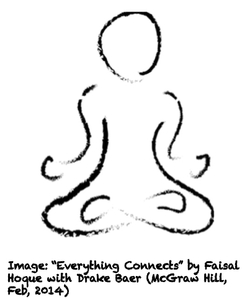For me, to unplug is to give up craving, to live mindfully, to move toward nirvana (Sanskrit for "complete liberation").
Today, we suffer from a constant craving for information and the need to blast out whatever is on our minds to the rest of the world -- thanks to social media. Unfortunately, all addictive behavior creates grief. And our addictive need to consume and share information is no different.
The Buddha -- who knew a thing or two about unplugging -- said:
"From craving grief arises,
From craving arises fear,
For him who is free from craving
There is no grief, then whence comes fear?
As a tree with firm, uninjured,
Roots, though cut down grows up again,
So when latent craving is not rooted out
Suffering again and again arises."
This passage has had a profound impact on my personal thinking. It refers to detachment as a practice to end craving and suffering. If we look at unplugging from this point of view, a few days of digital detox will be the equivalent to "cutting down a few roots" of a well-grown tree: craving will not stop.
Therefore, to truly unplug requires a disciplined approach to mentally detach from the in- and outflow of useless information. This detachment then becomes about -- and maybe comes from -- being mindful about what we do every day. Mindfulness has been described as "bringing one's complete attention to the present experience on a moment-to-moment basis." It does not imply taking a vacation every other month or putting away your digital devices for a day or two to reach a fleeting grasp of what might feel like nirvana.
Most of the time, I don't wake up at the crack of dawn to tune into news media, write emails, hop on social media or to dive into work-related matters. My dawns are my time to unplug I try to practice mindfulness meditation. And that helps set the promise of a new day: focus, creativity and positivity.
Why Should You Unplug?
We want to unplug in order to recharge. Recharging allows us to:
- Connect with our soul: If we are constantly overwhelmed with sound bites, we aren't allowed to discover what we are capable of and who we are.
Since we need to connect, create and lead regularly, it is our obligation to recharge every day. Being mindful creates serenity needed to be productive, one task at a time. But if our peace depends upon conditions being a certain way (aka visiting a "spa"), then we will get very attached. We become enslaved to our expectations, we want to control our situation and then we become more upset if anything disrupts it and gets in the way of our peace.
Since most of us can't fly off to an exotic island, visit a spa, we all need to find our own ways to unplug daily to connect and to lead. "Mindfulness Meditation" is one such way.
Mindfulness Meditation
The Sanskrit for mindfulness meditation is shamatha, which translates directly as calm abiding. The practice is not a method of capture, but of releasing. There's a Zen saying that meditation stretches open the grasping hand of thought -- and as that image suggests, we become much more pliable and open with sitting practice. To describe it, I'll paraphrase the instructions given by American nun Pema Chödrön, in her life-affirming Start Where You Are.
1) Sit upright with your legs crossed. If you need to sit in a chair, make sure both feet are flat on the ground and straighten your spine -- not straining it, but allow the spinal column to rest like a stack of coins. Rest your hands on your thighs.
2) Simply be aware of your breath as you exhale. Be "right there" with your breathe as it goes out with open focus that Chödrön says is "extremely relaxed" and "extremely soft," with about 25 percent of your attention resting on your breathe.
3) As you keep an awareness of your exiting breathe, be aware of everything else your senses are telling you--the light on the walls, the sounds on the street, the taste in your mouth.
4) Thoughts will assuredly arise. You will certainly wander off. This is good! When you realize you are talking to yourself in you mind, you can show some compassion to yourself by simply saying to yourself, "thinking." Whether your thoughts are terrifying or pleasing, name them "thinking" with all your honesty and gentleness.
If you are a starting meditation for the first time, appreciate that this is just a safari in your mind. You're not trying to "win" or "accomplish." You're just getting to know the neighborhood. And more than anything, give yourself the time to form the habit -- for that is another component of devotion. Give meditation a trial run: just do the above practice for ten minutes, every day for three weeks. See what happens. Get familiar. This familiarity requires a whole lot of devotion.
Related Posts by Faisal Hoque:
"Manifesting Our Destiny With Imagination, Devotion and Courage"
"Powering Through Tough Times"
"Living and Leading with Authenticity"
"Nurturing a Flexible Mind"
For more by Faisal Hoque, click here.
For more on emotional wellness, click here.
